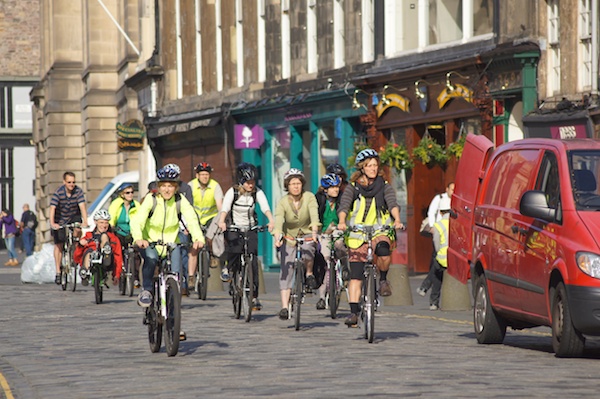Exercise is good for you….

Contributed by Gail Hutchison ANutr – Food and Health Development Worker at Edinburgh Community Food
Physical activity is a really important part of our health and well-being but in the UK we unfortunately don’t get enough of it. We are all aware that as a nation we are becoming more overweight with more diet related problems than ever before and, although what we eat is vitally important, physical activity also plays a big role in keeping us healthy in various ways.
Changes in the ways we live, such as driving more, more labour-saving technology and fewer people doing manual work has meant that we are no longer as active as previous generations. Although evidence shows that we have increased the amount of physical activity in the past few years, we are still not meeting the recommended guidelines of just 30 mins five days a week. Adults spend approximately seven hours a day sitting down, whether at work or in our leisure time.
So why is exercise so important for a long and healthy life? Firstly, doing regular physical activity can help us either maintain our ‘energy balance’ or to use up more energy than we consume. Energy balance is essentially the balance of calories consumed through eating and drinking compared to the number of calories burned through physical activity and the general functioning of our bodies. It’s pretty simple really: to keep our weight stable we should use the same amount of energy as we consume. To lose weight we’d need to use more energy than we consume.
Maintaining a healthy weight is really important for helping us to reduce risks of chronic diseases such as Type 2 diabetes. In fact, we can reduce the risk by 50%! Physical activity has also been medically proven help lower blood pressure and our cholesterol, reducing the risk of stroke, heart disease and early death by 30%.
In addition to this, physical activity is also great for strengthening our bones. Like our muscles, bone is a form of living tissue which responds to exercise by becoming stronger. Research has shown that young women and men who exercise regularly generally have a higher peak bone mass in their 30s. The best exercise for your bones is weight bearing exercises such as walking, jogging, climbing the stairs and dancing. However, even more gentle exercises such as yoga can improve balance, strength and coordination, reducing the chances of having falls and breaking bones, particularly in older adults.
Keeping active is not only fantastic for improving our physical health but can have a massive impact on out mental health. Loads of evidence tells us that regular exercise can have a huge effect on our mood and studies have shown that those who exercise regularly benefit from a more positive mood and lower rates of depression. When you exercise, your body releases chemicals called endorphins which interact with receptors in the brain and make us feel great. This is also helps reduce stress and worrying and also helps us to sleep better!
Not only is physical activity a great mood booster, it can also be a brilliant way to connect with people you know, get out and about, meet new people and make new friends. Evidence shows that good relationships with family, friends and the wider community are also massively important for mental wellbeing and also our overall health.
As we can see, regular physical activity has many health benefits but how much do we actually need? As mentioned earlier, to remain healthy, adults aged 19-64 should aim to be active on a daily basis, partaking in at least 150 minutes of physical activity per week which can be broken down into a more manageable five 30 minute sessions. But it doesn’t have to be marathon running! To an extent all movement is exercise. However, we should aim for a mixture of moderate-intense activity i.e. activity which will raise your heart rate and make you breathe faster, such as walking briskly – and vigorous activity i.e. activity which makes you breathe hard and fast, for example running or strenuous swimming. We should also be aiming do some activity which strengthens our muscles such as body weighted resistance exercises (eg push-ups, planks, lunges, squats), yoga or even heavy gardening such as shovelling.
Getting daily physical activity needn’t mean sweating it out in the gym every day. For a healthy balanced lifestyle, try to build physical activity into your daily routine:
• Try and increase regular walking by getting off the bus a couple of stops early, walking to work instead of driving, or even just getting out and about for a stroll on your lunch break.
• Take the stairs instead of using the lift whenever possible.
• Turn household activities such as gardening and heavy housework into exercise – anything which makes you feel warm and raises your heart rate can be counted.
• Join a local sports club e.g. badminton or dance. Not only is this a great way to get exercise, it’s also a brilliant way to make new friends.
Submitted by Gail Hutchison
